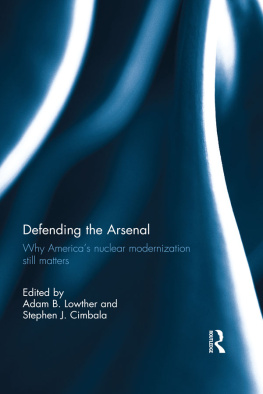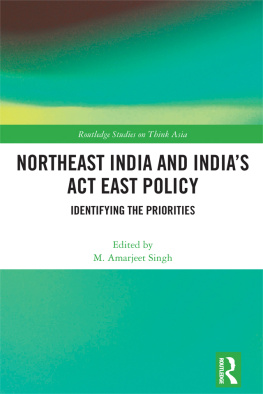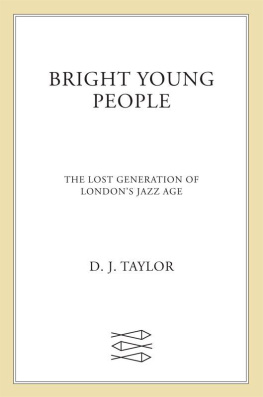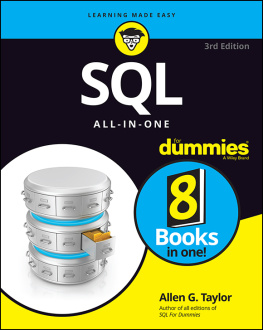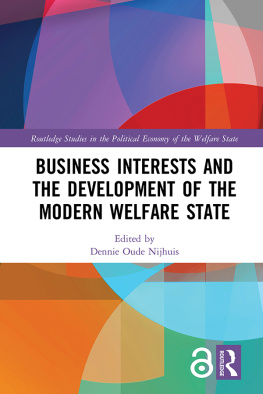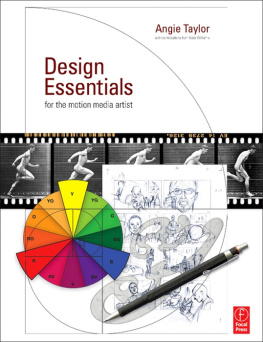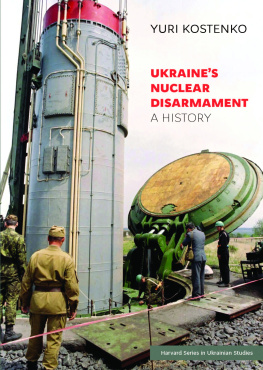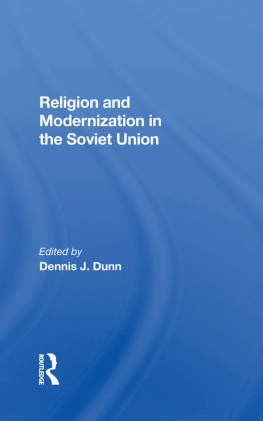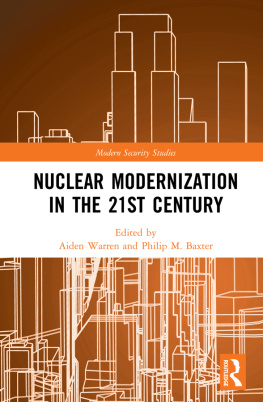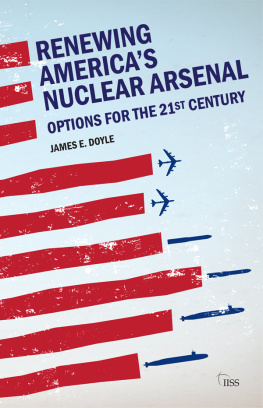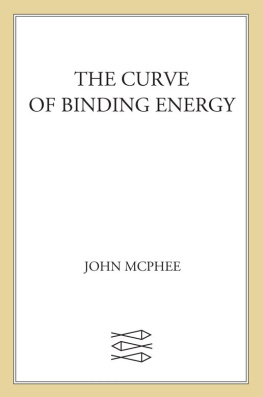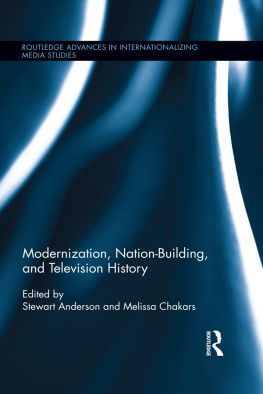Defending the Arsenal
One important area of interest within military and policy circles focuses on an effort to revitalize the nuclear triad amidst a number of competing strategic interests. The difficulties arising from US engagement in Iraq and Afghanistan are leading many scholars and policy makers to question whether a reinvigorated nuclear triad has any role in deterring modern adversaries. This volume takes an unashamed pro- nuclear modernization position and argues for designing and fielding new nuclear warheads and delivery systems (submarine, ICBM, and bomber) while also arguing against signing the Comprehensive Test Ban Treaty or agreeing to further reductions in the nuclear arsenal. It also argues that nuclear deterrence remains as relevant today, perhaps more, than it was during the Cold War. With so many authors advocating for Global Zero and highlighting perceived dangers from a nuclear arsenal, this work stands in stark contrast to the chorus of anti-arsenal works. Because of the works structure and effort to answer questions of current relevance, it should appeal to a broad audience including: service staffs, PME students, COCOM staffs, Pentagon personnel, Capitol Hill staffers, policy makers, academics, graduate students, and interested readers.
Adam B. Lowther, Director, School of Advanced Nuclear Deterrence Studies.
Stephen J. Cimbala, Penn State UniversityBrandywine.
First published 2017
by Routledge
2 Park Square, Milton Park, Abingdon, Oxon OX14 4RN
and by Routledge
711 Third Avenue, New York, NY 10017
Routledge is an imprint of the Taylor & Francis Group, an informa business
2017 selection and editorial matter, Adam B. Lowther and Stephen J. Cimbala; individual chapters, the contributors
The right of the editors to be identified as the authors of the editorial matter, and of the authors for their individual chapters, has been asserted in accordance with sections 77 and 78 of the Copyright, Designs and Patents Act 1988.
All rights reserved. No part of this book may be reprinted or reproduced or utilized in any form or by any electronic, mechanical, or other means, now known or hereafter invented, including photocopying and recording, or in any information storage or retrieval system, without permission in writing from the publishers.
Trademark notice: Product or corporate names may be trademarks or registered trademarks, and are used only for identification and explanation without intent to infringe.
British Library Cataloguing-in-Publication Data
A catalogue record for this book is available from the British Library
Library of Congress Cataloging- in-Publication Data
Names: Lowther, Adam, editor of compilation. | Cimbala, Stephen J.,
editor of compilation.
Title: Defending the arsenal : why Americas new arsenal still matters /
edited by Adam Lowther and Stephen Cimbala.
Description: Milton Park, Abingdon, Oxon ; New York, NY : Routledge,
2016.
Identifiers: LCCN 2016015761| ISBN 9781138204546 (hardback) |
ISBN 9781315460697 (ebook)
Subjects: LCSH: Nuclear weaponsGovernment policyUnited States. |
ArsenalsUnited States. | United StatesMilitary policy. | Deterrence
(Strategy) | National securityUnited States.
Classification: LCC U264.3 .D44 2016 | DDC 355.02/170973dc23
LC record available at https://lccn.loc.gov/2016015761
ISBN: 978-1-138-20454-6 (hbk)
ISBN: 978-1-315-46069-7 (ebk)
Typeset in Times New Roman
by Wearset Ltd, Boldon, Tyne and Wear
Contents
Stephen J. Cimbala is Distinguished Professor of Political Science at Penn State UniversityBrandywine. Dr. Cimbala is the author of numerous works in the fields of nuclear arms control and US national security policy, among other topics. A past winner of Penn States Eisenhower Award for Distinguished Teaching, Dr. Cimbala has recently authored The New Nuclear Disorder (Ashgate, 2015) and co-authored US National Security (with Sam C. Sarkesian and John Allen Williams, Lynne Rienner, 2013).
Michaela Dodge is a senior policy analyst at The Heritage Foundation, a Washington, DC-based think tank, where she works on nuclear weapons and missile defense policy issues. She holds a master of science degree from Missouri State University and is a doctoral student in political science at george Mason University.
Anita Feugate-Opperman is the Director, Commanders Action group for Air Force global Strike Command. She received her commission through the Air Force Reserve Officer Training Corps in May 1994. She holds a bachelor of arts degree in political science from Indiana University, a masters degree in information systems management from Lesley University, a masters degree in military operational art and science from Air University, and a masters degree in military strategy from Air University.
Robert A. Hoskins is the Personnel and Training Panel Chair in the Air Force Corporate Structure. He began his military career as a personnel officer in August 1995, and earned his commission from the USAF Officer Training School. He holds a bachelor of science degree from Indiana University, and masters degrees in military operational art and science and national security studies from Air University.
Shelley Bischoff Kavlick is the acting vice commandant of the Officer Training School (OTS), Maxwell Air Force Base, Alabama. OTS is the largest Air Force annual accession source, training over 2,600 total-force officers for the Active, guard, and Reserve components. Col. Kavlick graduated from the University of California at Davis and was commissioned a distinguished graduate from the Air Force Reserve Officer Training Corps in 1995. She holds a masters degree from the Royal Military College of Science, Cranfield University, England. Col Kavlick started her career as an aircraft maintainer.
Thomas C. Kirkham is chief, Air Force Weapons Safety, Air Force Safety Center, Kirtland AFB, NM. He enlisted in the Air Force Reserves in April 1987 and was a crew chief on the C-5A galaxy. He was then commissioned through the Reserve Officer Training Corps in 1993 and has since served in a variety of maintenance and logistics assignments at squadron, wing, major command, and unified command levels. He is a master aircraft/munitions maintenance officer with experience on the B-2A, B-52H, F-15E, and MQ-1 aircraft as well as numerous tactical nuclear and conventional weapons. Col. Kirkham is a graduate of the Joint Forces Staff College and has a bachelor of science degree in business management from Texas State University, a master of aeronautical science degree from Embry-Riddle Aeronautical University, a master of military arts and sciences degree from the Air Command and Staff College, and a master of strategic studies degree from the Air War College.
Adam B. Lowther (BA, Arizona State University; MA, Arizona State University; PhD, University of Alabama) is Director of the School of Advanced Nuclear Deterrence Studies at Kirtland Air Force Base. Previously, he was Research Professor and Director of the Center for Academic and Professional Journals at the Air Force Research Institute (AFRI), Maxwell AFB, AL. His principal research interests include deterrence, airpower diplomacy, and the Asia-Pacific. He is author or editor of five books and has published in the New York Times , Boston Globe , Joint Forces Quarterly , Strategic Studies Quarterly , and a variety of other journals and outlets. Dr. Lowther has served on the faculty of two universities where he taught courses in international relations, political economy, security studies, and comparative politics. Early in his career he served in the US Navy aboard the USS Ramage (DDG-61). He also spent time at CINCUSNAVEUR-London and with Naval Marine Construction Battalion 17.

